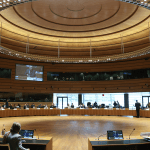During a high-level conference on “Addressing Mobility Poverty Across the EU”, organised by the European Committee of the Regions (CoR) together with the International Association of Public Transport (UITP), on 12 March at the CoR, regional and local leaders called for more accessible, efficient and sustainable mobility system, with public transport at its centre, to ensure social and territorial cohesion in the EU.
CoR members, Marie-Antoinette Maupertuis, (FR/EA), Justīne Panteļējeva (LV/Greens) and Władysław Ortyl (PL/ECR), intervened in two panel discussions on “Accessibility, connectivity and EU policy response” and on “Affordability and funding perspectives” with high-level representatives of four different Directorate Generals of the European Commission, UITP, as well as key stakeholders and experts.
The lack of affordable, efficient, safe, and sustainable transport services affects millions of EU citizens in rural, peri-urban, and low-income areas, restricting access to healthcare, education, and employment for vulnerable groups, including low-income families, the elderly, and people with disabilities. Moreover, inadequate transport infrastructure jeopardises regional economic growth and deepens territorial disparities.
Local and regional leaders emphasised that mobility challenges vary across regions and that a place-based approach is crucial in addressing transport poverty. They stressed the need for tailored solutions to meet the specific needs of each territory, and strong partnerships between social partners and public authorities at all levels of governance, to ensure a fair transition in mobility that guarantees the shift to sustainable transport is accessible and inclusive for all.
Cities and regions said adequate funding is crucial for ensuring European regions can implement accessible and sustainable mobility infrastructure. The objectives of EU policies and funding instruments need to be defined in a multi-level governance approach in order to guarantee sustainable and fair transport mobility that all can afford. Members urged the mobilisation of EU funds, including the Social Climate Fund, Cohesion Policy, and the Recovery and Resilience Facility, to support place-based mobility solutions that address transport poverty and promote inclusive and affordable public transport.
Quotes:
Marie-Antoinette Maupertuis (FR/EA), President of the Assembly of Corsica, said: “Mobility in Corsica is not an option, it’s a necessity. The EU must take into account the realities of our islands: the high cost of travel, our dependence on sea and air connections, and the urgent need for an ecological transition that must also involve our islands. Europe has a key role to play in guaranteeing island citizens a fair right to mobility. It is time to go beyond principles and put in place concrete and sustainable mechanisms, by fully applying Article 174 and adapting European policies to the specific realities of islands such as Corsica.”
Justine Panteļējeva (LV/Greens) Councillor of the Local Government Council, Riga City Council, said: “To design mobility for its most vulnerable user, is to create a system that will benefit everyone. Mobility and access to it is fundamental to modern, equitable society and we as politicians cannot shy away from the responsibility of doing so.”
Władysław Ortyl (PL/ECR), President of the Podkarpackie region, said: “Podkarpackie, with its unique geographical conditions as a border and partially mountainous region, faces significant challenges regarding mobility poverty. However, we have a clear strategy in place to improve transport accessibility. Key initiatives, such as rail network modernisation and the expansion of multimodal transport, are designed to better connect our residents and are supported by EU funding. The Via Carpatia project plays a vital role in this strategy, enhancing connectivity across Europe and linking Podkarpackie with other regions. Rzeszów-Jasionka airport plays a crucial role in regional connectivity, as well as in linking Ukraine with the rest of Europe.”
More information: European Committee of the Regions







Leave a Reply